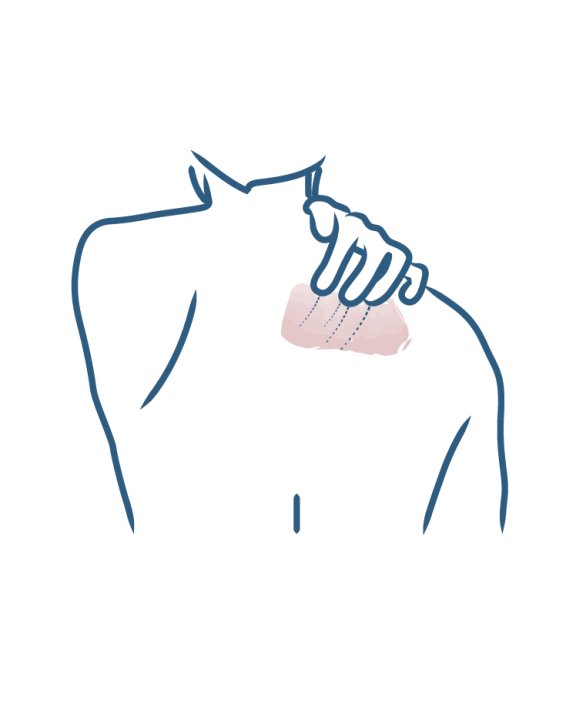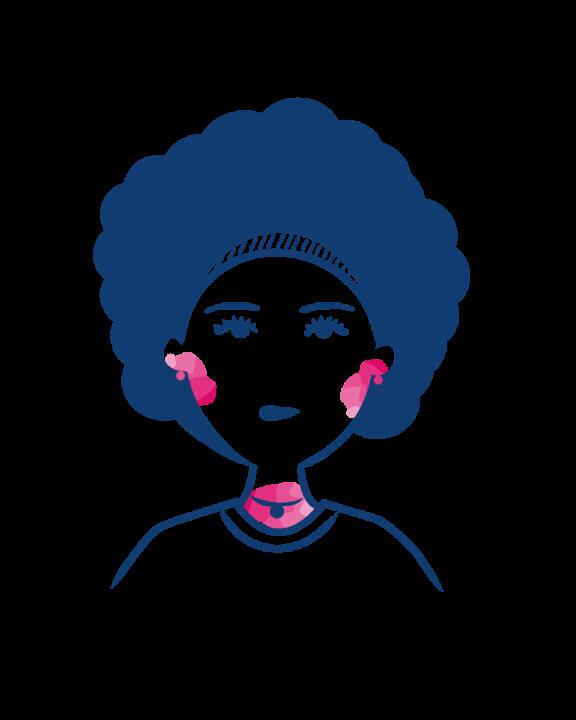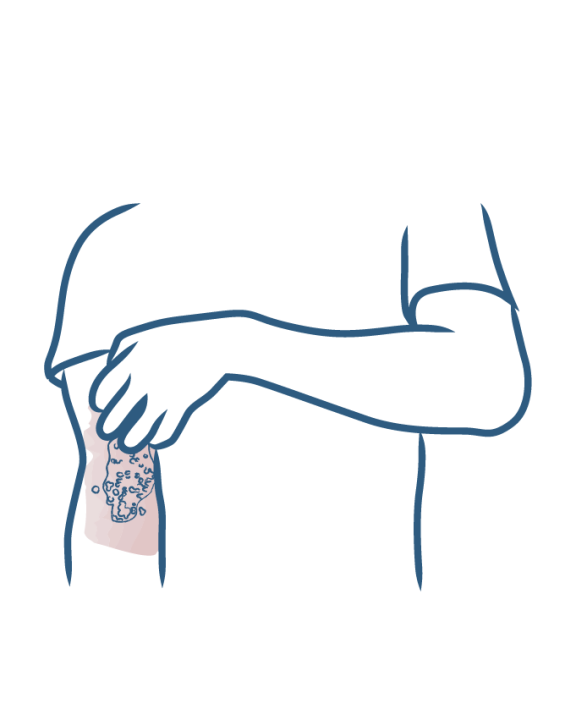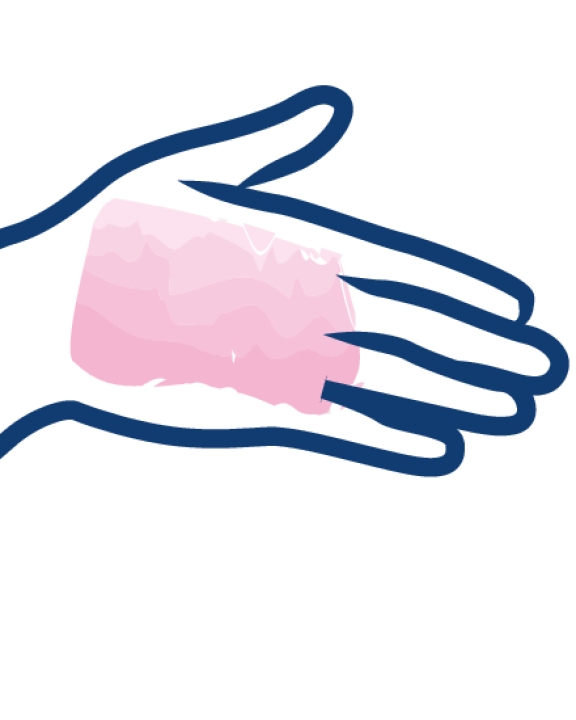Body eczema: hands, feet, arms, back, face, etc
- SUMMARY
- Eczema
Arm eczema (elbows, armpits, forearms)
- Living with eczema day to day
- What are the habits to avoid when you have eczema?
- Eczema cream, ointment: what should you use?
- What soap should be used for eczema?
- Swimming pool, swimming when you have eczema?
- Eczema: can it be cured?
- Eczema: how to treat itching
- Eczema: what food should you eat?
- Eczema: What daily reflexes should you adopt?
- Which detergent should eczema patients use?
- Eczema: how can flare-ups be avoided?
- Body eczema: hands, feet, arms, back, face, etc
- Arm eczema (elbows, armpits, forearms)
- Foot eczema
- Eczema in the ears
- Scalp eczema
- Eczema on the back
- Eczema on the stomach and belly button
- Eczema around the mouth
- Eczema of the legs or varicose eczema
- Eczema of the eyelids, eyes or palpebral eczema
- Eczema on the neck and nape of the neck
- Facial eczema
- Hand and finger eczema (chronic hand eczema)
- Baby’s eczema, infant eczema: what is it?
- Eczema in babies: what habits should you adopt?
- How should you treat baby’s and infant’s eczema?
- Which cream should you use for baby's eczema?
- When should you consult a physician about your baby's eczema?
- What soap should be used for babies with eczema?
- Eczema in babies and children: the areas most often affected

Arm eczema (elbows, armpits, forearms)
Arm eczema is very common and can affect one or more parts of the arm, including the elbows, armpits and forearms.
Who is affected by arm eczema?
The areas affected by arm eczema vary according to age:
- In babies, the arms are affected on the outer side;
- Older children often have eczema on the inside of the elbows and wrists;
- In adults, the skin folds are also frequently affected, as well as the outer sides of the arms and the shoulders. Eczema under the arms is also possible, due to rubbing and sweating, but also due to the use of unsuitable deodorant (e.g. containing fragrances or alcohol).
What are the consequences of arm eczema?
The itching associated with arm eczema is sometimes very intense. The child or adult scratches through their clothing, and when they can, they lift up their sleeve and scratch themselves directly: the eczema lesions on the elbow are sometimes very itchy. The risk of superinfection and scarring is then significant.
Some people are ashamed of the eczema plaques they have on their arms. Wearing long sleeves systematically allows them to hide their eczema on their forearms. Long sleeves are a bad idea, as they can cause skin irritation and/or excessive sweating, which can eventually worsen arm eczema.
How should you relieve your arm eczema?
To relieve arm eczema, the basic treatment is again based on cortisone creams, including in the skin folds, even if the skin is thinner and fragile in this area.
In the case of elbow eczema or underarm eczema, avoid the use of the ointment form and opt for the cream form to avoid any risk of maceration.
In case of severe and generalized arm eczema, apply the cortisone cream and then bandage the arm, using a moistened gauze and then a dry bandage. This large-scale bandage, also called "Wet Wrapping", can be kept on overnight and helps to optimize the efficacy of the treatment, increase skin hydration and limit scratching.
If you have eczema on your hands or wrist, wearing fancy jewelry or a watch that is too tight can be a cause. Remember to choose bracelets that are wide enough to limit friction.
Please note: eczema does not only affect the upper limbs! Leg eczema can take many forms. Varicose eczema affects the lower legs and is linked to circulatory problems. Eczema on the foot is also possible.
More information
- Discover Hand and finger eczema (chronic hand eczema)
Body eczema: hands, feet, arms, back, face, etc
Hand and finger eczema (chronic hand eczema)
- Discover Facial eczema
Body eczema: hands, feet, arms, back, face, etc
Facial eczema
- Discover Eczema on the stomach and belly button
Body eczema: hands, feet, arms, back, face, etc
Eczema on the stomach and belly button
- Discover Eczema on the back
Body eczema: hands, feet, arms, back, face, etc
Eczema on the back
- Discover Scalp eczema
Body eczema: hands, feet, arms, back, face, etc
Scalp eczema
- Discover Eczema on the neck and nape of the neck
Body eczema: hands, feet, arms, back, face, etc
Eczema on the neck and nape of the neck
- Discover Eczema of the legs or varicose eczema
Body eczema: hands, feet, arms, back, face, etc
Eczema of the legs or varicose eczema
- Discover Eczema around the mouth
Body eczema: hands, feet, arms, back, face, etc
Eczema around the mouth
- Discover Foot eczema
Body eczema: hands, feet, arms, back, face, etc
Foot eczema
- Discover Eczema of the eyelids, eyes or palpebral eczema
Body eczema: hands, feet, arms, back, face, etc
Eczema of the eyelids, eyes or palpebral eczema
Our care routines
Atopic eczema, contact eczema, chronic eczema, eyelid eczema





